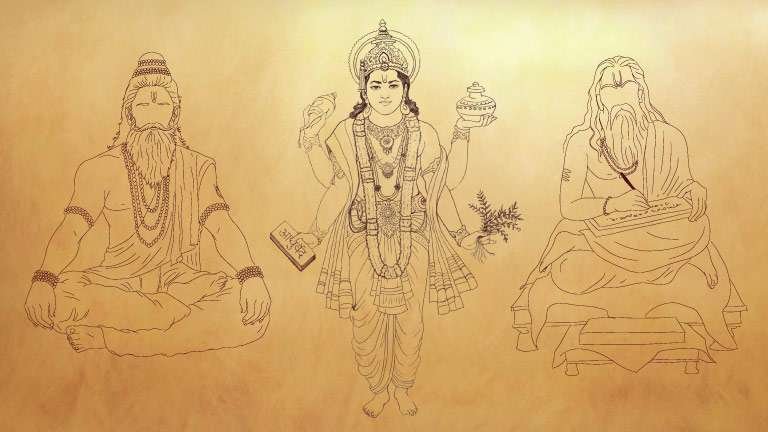10 Great Indian Sages – Wisdom and Spiritual Legacy
Introduction: Indian Rishis, also known as sages or seers, have played a significant role in shaping India’s spiritual and philosophical traditions.

In this post we provide you with a selection of influential Rishis who have made substantial contributions to Indian philosophy and spirituality.
- Sage Vyasa:
- Compiled and classified the Vedas, the ancient scriptures of Hinduism.
- Authored the Mahabharata, the epic that includes the Bhagavad Gita.
- Composed the Puranas, which contain mythological narratives and genealogies.
- Known for his wisdom and role as a spiritual guide.
- Considered one of the Chiranjivis (immortals) in Hindu mythology.
- Established the Guru-Shishya (teacher-disciple) tradition.
- Associated with the preservation and dissemination of ancient knowledge.
- Revered as a revered figure in the Advaita Vedanta tradition.
- His name “Vyasa” means “the arranger” or “compiler.”
- Symbolizes the continuity and transmission of Vedic wisdom through generations.
- Sage Valmiki:
- Authored the Ramayana, an epic poem about the life of Lord Rama.
- Known as the “Adi Kavi” or the first poet in Sanskrit literature.
- His composition is revered as one of the most significant works in Hindu literature.
- Explores themes of dharma (duty), devotion, and the triumph of good over evil.
- Transformed from a bandit to a sage through divine intervention.
- Associated with compassion, wisdom, and spiritual transformation.
- Regarded as the original poet who popularized the story of Lord Rama.
- His verses are celebrated for their lyrical beauty and moral teachings.
- His transformation symbolizes the potential for personal growth and redemption.
- His work continues to inspire and guide millions of people.
- Sage Vasishta:
- Known as the preceptor of Lord Rama in the Ramayana.
- Renowned for his wisdom, knowledge, and spiritual guidance.
- Associated with the teachings of yoga, philosophy, and meditation.
- Emphasized the practice of self-control and virtuous living.
- Regarded as one of the Saptarishis (seven sages) in Hindu mythology.
- Considered an embodiment of tranquility and equanimity.
- His dialogue with Sage Vishvamitra is depicted in the Ramayana.
- His teachings on Advaita Vedanta influenced various philosophical schools.
- Revered as a sage who personifies wisdom and enlightenment.
- Symbolizes the pursuit of spiritual knowledge and the attainment of self-realization.
- Sage Gautama:
- Known for his contributions to the Nyaya philosophy, a school of Hindu logic.
- Formulated logical and epistemological principles.
- Authored the Nyaya Sutras, which provide a systematic approach to reasoning.
- Emphasized the importance of valid inference and sound argumentation.
- Developed methodologies for debate and philosophical inquiry.
- Contributed to the understanding of perception, inference, and reliable knowledge.
- His work influenced the development of Indian logic and debate traditions.
- Considered one of the foremost proponents of logical reasoning in ancient India.
- Revered as a sage who brought clarity and rigor to philosophical discussions.
- Symbolizes the pursuit of truth through rational inquiry.
- Sage Patanjali:
- Authored the Yoga Sutras, a foundational text on classical yoga philosophy.
- Systematized the principles of yoga and provided guidance for spiritual seekers.
- Described the eight limbs (Ashtanga) of yoga, including meditation and ethical principles.
- Emphasized the practice of meditation (dhyana) to attain self-realization.
- Explored the nature of the mind and techniques to calm its fluctuations.
- His work continues to be a cornerstone of yoga philosophy and practice.
- Revered as the father of classical yoga and one of the greatest sages of India.
- Symbolizes the integration of physical, mental, and spiritual well-being.
- His teachings have influenced numerous yoga traditions and seekers worldwide.
- Represents the path to inner transformation and self-discovery.
- Sage Jaimini:
- Known for his work in the Mimamsa school of Hindu philosophy.
- Authored the Mimamsa Sutras, which elucidate the principles of Vedic rituals.
- Explored the interpretation, application, and efficacy of Vedic injunctions.
- Developed methodologies for scriptural exegesis and ritual performance.
- Emphasized the importance of performing rituals with precision and faith.
- Contributed to the understanding of the nature and purpose of sacrifices.
- His work influenced the development of Vedic hermeneutics.
- Revered as a sage who unraveled the complexities of Vedic rituals.
- Symbolizes the significance of ritualistic practices in Hindu tradition.
- His teachings continue to guide practitioners of Vedic rituals.
- Sage Yajnavalkya:
- Associated with the Brihadaranyaka Upanishad, one of the oldest and important Upanishads.
- Engaged in profound philosophical dialogues with other sages.
- Explored the nature of reality, the self, and the ultimate truth (Brahman).
- Contributed to the understanding of the relationship between the individual and the cosmos.
- Offered insights into the concepts of Atman (self) and Brahman (ultimate reality).
- His teachings shaped the foundation of Advaita Vedanta philosophy.
- Emphasized the importance of self-inquiry and direct realization of truth.
- Revered as a sage who unveiled the mysteries of existence and consciousness.
- Symbolizes the pursuit of spiritual liberation and the path of knowledge (Jnana Yoga).
- His teachings continue to inspire seekers of truth and self-realization.
- Sage Kanada:
- Revered as the founder of the Vaisheshika school of philosophy.
- Proposed an atomic theory of matter and developed a systematic framework.
- Explained the nature of reality through a classification of atoms and substances.
- Introduced the concept of nine fundamental realities (padarthas).
- Explored the nature of causality and the relationship between substance and quality.
- His work influenced Indian physics, metaphysics, and scientific inquiry.
- Contributed to the understanding of the physical world and its constituents.
- Revered as a sage who laid the foundation for the philosophy of atomism.
- Symbolizes the integration of scientific inquiry and metaphysical exploration.
- His teachings continue to inspire philosophers and scientists.
- Sage Kapila:
- Regarded as the founder of the Samkhya school of philosophy.
- Explored the nature of existence, consciousness, and the relationship with matter.
- Developed a dualistic philosophy that distinguishes between purusha (consciousness) and prakriti (matter).
- Described the principles of causality, evolution, and the three gunas (qualities).
- Emphasized the pursuit of self-knowledge and liberation from suffering.
- Contributed to the understanding of the nature of bondage and liberation.
- His work influenced various philosophical schools in India.
- Revered as a sage who unraveled the mysteries of existence and consciousness.
- Symbolizes the path of discernment and self-realization.
- His teachings continue to be explored and contemplated by seekers of truth.
- Sage Bharadwaja:
- Known for his contributions to various branches of knowledge, including medicine (Ayurveda), astrology, and astronomy.
- Revered as one of the Saptarishis (seven sages) in Hindu mythology.
- Authored texts on medicine, providing insights into healing methods and herbal remedies.
- Contributed to the understanding of the human body and its connection to the environment.
- Associated with the development of astrological principles and predictive methods.
- Explored the movements of celestial bodies and their influence on human life.
- His work influenced the development of Indian medical and astrological traditions.
- Revered as a sage who integrated knowledge from various disciplines.
- Symbolizes the pursuit of holistic well-being and the interconnectedness of the universe.
- His teachings continue to be a source of inspiration in the fields of medicine and astrology.
- Great Indian Sages: Wisdom and Spiritual Legacy
- Pioneering Indian Rishis: Insights and Contributions
- Mystics of India: Spiritual Luminaries and Philosophers
- Sages of Ancient India: Shaping Philosophy and Knowledge
- Trailblazing Rishis: Exploring Truth and Cosmic Wisdom
What’s your Reaction?
+1
+1
+1
+1
+1



